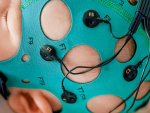Displaying items by tag: school of medicine
The cheers and claps of the Blazers roared as Lexie rang the bell to mark the completion of her last breast cancer radiation treatment.
Tagged under
Analysis of a survey of 18,041 people in rural KwaZulu-Natal revealed a discrepancy between the ability of the South African health system to respond to the health needs of people with communicable diseases and the health needs of people with non-communicable diseases.
Tagged under
This new grant will be used to develop a full-scale family of devices for inhaled nitric oxide delivery for patients with pulmonary hypertension that can be used in health care facilities and for at-home care.
Tagged under
Tagged under
The Blazer Bridge Fund is intended to identify and assist in the development of promising ideas, discoveries, innovations and/or technologies from UAB faculty and staff that have commercial potential.
Tagged under
- release
- harbert institute for innovation and entrepreneurship
- school of education
- school of engineering
- school of medicine
- department of otolaryngology
- department of anesthesiology and perioperative medicine
- department of microbiology
- department of medicine
- division of hematology and oncology
- division of pulmonary allergy and critical care medicine
- division of gerontology geriatrics and palliative care
Biomedical Sciences Ph.D. student Jazmine Benjamin was selected as an inaugural fellow for the Howard Garrison Advocacy Fellowship program.
Tagged under
During POTA workshops, attendees will attain proficiency in evidence-based treatments, enhancing capacity to deliver holistic psychosocial cancer care.
Physicians in the O’Neal Comprehensive Cancer Center at UAB are advancing the field of thyroid care with cutting-edge, patient-specific procedures and collaborative research investigations.
Tagged under
UAB researchers conducted a study in end-stage heart failure patients with cardiogenic shock that revealed that B-type natriuretic peptide levels were elevated in end-stage heart failure but did not predict clinical outcomes.
Tagged under
Certain men may have a higher risk of prostate cancer based on family history or ethnicity or race, and ancestry and should have their first screening discussions at the age of 40.
The UAB Neonatal Helping Hands program provides volunteers the opportunity to hold, rock, talk, sing and read to infants in the RNICU and CCN. The program, which was paused in 2020 due to COVID, has relaunched and is accepting volunteer applications.
Tagged under
Lung-resident memory B cells produced during influenza are long-living immune cells that migrate to the lungs from draining lymph nodes and lie in wait as early responders that can quickly react to future infections. They are key sentinels against subsequent viral variants.
Tagged under
The M.D./Ph.D. student has since moved on to clinical studies, but the research into possible drugs to treat Alzheimer’s disease continues.
Tagged under
Ovarian cancer is known as the “silent killer” due to the difficulty in early detection because most women do not have any early symptoms.
Tagged under
The modified mRNA — delivered after experimental heart attacks — transiently allows heart muscle cells to proliferate, leading to reduced infarct size and improved heart performance compared to untreated animals.
While preventive treatment with vigabatrin delayed the onset and prevalence of infantile spasms in TSC infants, it had no impact on focal seizures, drug-resistant epilepsy, or improvement of cognitive and behavioral scores at 24 months.
Tagged under
UAB researchers make a case for utilizing telehealth technologies in the care of injured rural patients stating that teletrauma can improve access to trauma care for rural patients.
Tagged under
The study’s findings provide valuable insights into the role of diet composition in Type 2 diabetes management.
Tagged under
Rachel Smith, Ph.D., professor in the UAB School of Engineering and principal investigator in the Neural Signal Processing and Modeling lab, was recently awarded multiple grants to fund research in seizure onset localization.
Tagged under



















